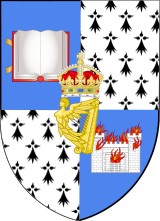University of Dublin
Ollscoil Átha Cliath | |
 | |
| Latin: Universitas Dublinensis[1] | |
| Type | Public |
|---|---|
| Established | 1592 |
| Endowment | €216 million (2019)[2] |
| Budget | €382.9 million (2019)[2] |
| Chancellor | Mary McAleese |
Academic staff | 777 (2014)[3] |
Administrative staff | 2,097, of which 606 research staff (2014)[3] |
| Students | 16,729 (2014) |
| Undergraduates | 12,420 (2014)[4] |
| Postgraduates | 4,309 (2014)[4] |
| Location | , 53°20′40″N 06°15′28″W / 53.34444°N 6.25778°W |
| Campus | Urban 468,000 square metres (46.8 ha) (incl. satellite sites)[5] |
| Colours | Trinity Pink[6] |
| Affiliations | Coimbra Group EUA IUA UI LERU AMBA CLUSTER[7] |
| Website | www.tcd.ie |
The University of Dublin is a well-known institution located in the capital city of Ireland, Dublin. Established in the early 16th century, it holds a significant place in the history of education and has played a crucial role in shaping the academic landscape of Ireland.[8]
Location
[change | change source]The University of Dublin is situated in the heart of Dublin, the capital and largest city of Ireland. Its main campus is in the historic area of Trinity College Dublin, providing a picturesque setting for students to pursue their studies.
Establishment
[change | change source]Founded in 1592 by Queen Elizabeth I, the University of Dublin has a rich and storied history. It was established with the vision of providing quality education to the people of Ireland and beyond. The university's founding charter emphasizes the pursuit of knowledge, fostering a spirit of inquiry, and contributing to the intellectual and cultural development of society.
Important events
[change | change source]Throughout its long history, the University of Dublin has witnessed and been a part of several significant events. One notable period is the Irish Renaissance in the late 19th and early 20th centuries when the university played a central role in the cultural revival of Ireland. This era saw the emergence of renowned literary figures such as W.B. Yeats, Samuel Beckett, and James Joyce, who were associated with the university.[9]
People of significance
[change | change source]The University of Dublin has been home to many distinguished individuals who have made significant contributions to various fields. Notable alumni include famous writers like Jonathan Swift, author of "Gulliver's Travels," and Bram Stoker, the creator of "Dracula." In the field of science, Ernest Walton, a Nobel laureate in physics, conducted groundbreaking research at the university.
Modern significance
[change | change source]Today, the University of Dublin continues to uphold its commitment to academic excellence and research. It offers a wide range of undergraduate and postgraduate programs across various disciplines, attracting students from around the world. The university's commitment to innovation and research has contributed to advancements in science, literature, and technology.
Conclusion
[change | change source]The University of Dublin stands as a beacon of learning with a rich history that spans centuries. From its establishment in the 16th century to its current position as a global center for education and research, the university has played a vital role in shaping the intellectual and cultural landscape of Ireland. Its enduring commitment to knowledge and excellence ensures that it remains a respected institution in the world of academia.[10]
References
[change | change source]- ↑ See letter on p. 269
- ↑ 2.0 2.1 https://www.tcd.ie/financial-services/external-assets/pdfs/Consol_Financial_Statements_1819.pdf [bare URL PDF]
- ↑ 3.0 3.1 "Staff Numbers – Trinity College Dublin". Tcd.ie. 20 October 2014. Archived from the original on 4 April 2015. Retrieved 28 December 2014.
- ↑ 4.0 4.1 "Student Numbers – Trinity College Dublin". Tcd.ie. 20 October 2014. Archived from the original on 2 April 2015. Retrieved 28 December 2014.
- ↑ "Development Control Plan Maps – Trinity College Dublin" (PDF). Archived (PDF) from the original on 7 December 2008. Retrieved 21 July 2016.
- ↑ "Sporting Commons Press Release April 3rd 2012" (PDF). DUCAC. Archived from the original (PDF) on 16 November 2017. Retrieved 14 July 2016.
- ↑ "TCD Trinity College Dublin | cluster.org". Archived from the original on 6 May 2012. Retrieved 26 April 2012.
- ↑ https://www.britannica.com/topic/University-of-Dublin
- ↑ https://www.iua.ie/ouruniversities/universities-timeline/
- ↑ https://www.si-ireland.com/study-guide/top-five-reasons-study-university-college-dublin/

